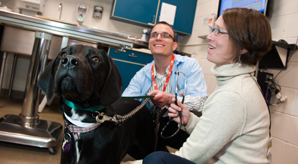

Thanks to advancing medical care, our pets are living longer than they ever have before. While it is a wonderful gift to have more time to spend with our pets, there are medical issues that present themselves in old age. A pet’s body ages faster than a human body and your pet can find itself in a geriatric state as early as the age of seven human years.
Giving special care to your elderly pets can help increase the quality of their later years of life. The American Veterinary Medical Association suggests several areas of emphasis when caring for your older pet:
Veterinary Care: It is important for elderly pets to have semi-annual vet visits so health problems can be caught and treated early. You should also speak with your veterinarian about any vaccination needs that may change as your pet gets older.
Diet & Nutrition: Many older pets need to transition to foods that are more readily digested, have different calorie levels, and have anti-aging ingredients.
Parasites: Older pets can be more prone to parasite infection since their immune systems are less healthy. As a result, they may not be able to fight off disease or heal as fast as they once could.
Mobility: It can be especially important to keep your older pet mobile through appropriate exercise. This can keep your pet healthier and more mobile for longer.
Mental Health: Senility can be common in older pets. You can keep your pet mentally active through stimulating interactions such as playing.
Environmental Considerations: A change in lifestyle often goes hand-in-hand with age. Your older pet may need new sleeping areas to avoid stairs or more protection from the outdoors.
The Colorado State University Veterinary Teaching Hospital offers comprehensive care for all pets and can give you special information regarding caring for your elderly pets. Call (970) 497-5000 for more information. And if you, yourself, are older and need assistance caring for your pet check out the CSU Pets Forever program.